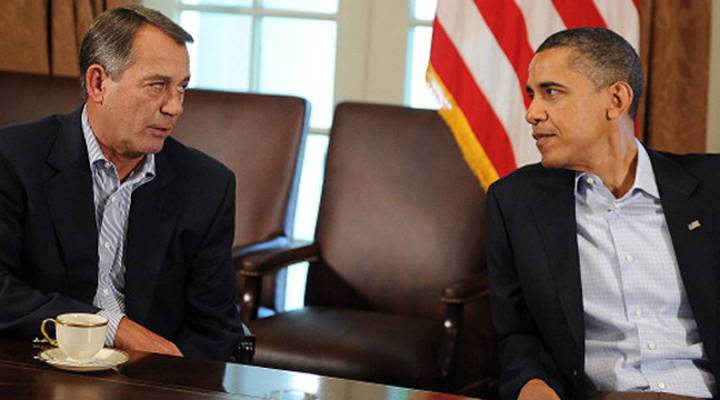
The downgrade: What political gap?

Kai Ryssdal: Let’s take a step back and retrace the steps that got us to AA+. From New York, Marketplace’s Stacey Vanek Smith starts us off.
Stacey Vanek Smith: Standard & Poor’s said it had two reasons for downgrading U.S. debt. Call it a cocktail: equal parts economic and political. And that’s pretty unusual, says economic analyst Keith Davis with Farr Miller and Washington.
Keith Davis: It’s a critique of the whole political process. It’s as much a critique of that as it is our financial situation.
In its statement (pdf), S&P said it doesn’t think Congress will be able to bridge the political gap and do what needs to be done to reduce the deficit. And a lot more needs to be done, says Michelle Meyer, senior U.S. economist for Bank of America, Merrill Lynch.
Michelle Meyer: In order to have a true plan for fiscal austerity, it has to address Medicare and Medicaid and also tax reform.
Tax reform — a.k.a. raising taxes and closing tax loopholes to help pay down the deficit. Nearly all Republican lawmakers have signed a pledge not to raise taxes.
Charles Gabriel heads Capital Alpha Partners, a political risk forecasting group.
Charles Gabriel: The biggest fights are clearly over Republicans’ resistance to adding any new revenue as part of the solution. And on the other hand, the Democrats are very resistant to tackling entitlements.
S&P said the cuts Congress has made are not sufficient. It also blamed an unwillingness to raise revenues and invest in kickstarting the economy and creating jobs — jobs which would generate tax revenue. Again, analyst Keith Davis.
Davis: S&P outlined a few things that they needed to see to be more comforted that we are on a more sustainable path going forward with regard to meeting our debt. And the political wrangling that took place I think signaled to them that we are not up to the task of coming to a compromise.
Particularly with elections just around the corner.
In New York, I’m Stacey Vanek Smith for Marketplace.
There’s a lot happening in the world. Through it all, Marketplace is here for you.
You rely on Marketplace to break down the world’s events and tell you how it affects you in a fact-based, approachable way. We rely on your financial support to keep making that possible.
Your donation today powers the independent journalism that you rely on. For just $5/month, you can help sustain Marketplace so we can keep reporting on the things that matter to you.


















